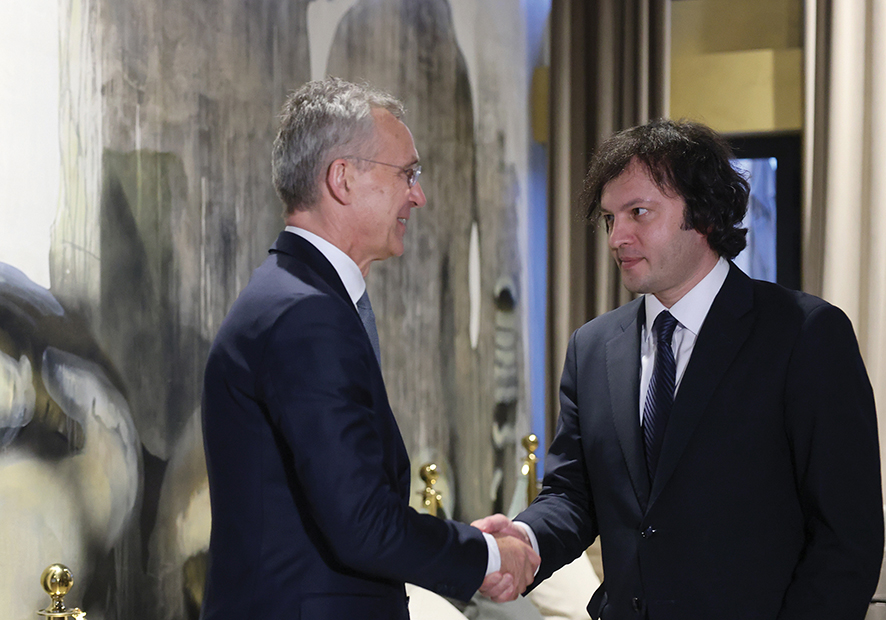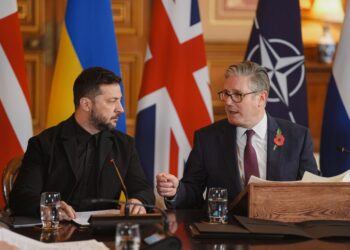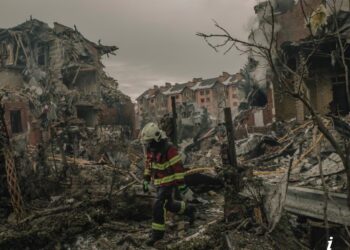The visit of NATO Secretary General Jens Stoltenberg to Georgia began on March 18, when he arrived from Azerbaijan. The Georgian Foreign Minister, Ilia Darchiashvili, and the Georgian Ambassador to NATO, Viktor Dolidze, were at Tbilisi airport to greet him.
During his short visit, the NATO Secretary General met with President Salome Zurabishvili and Prime Minister Irakli Kobakhidze.
Georgian President Salome Zurabishvili hosted him at the Orbeliani Presidential Palace, where she spoke to him about Georgia’s integration into the Euro-Atlantic structures and its progress on this path.
Their conversation also touched on Russia’s aggression in Ukraine, the solidarity of the international partners and community with Ukraine, the impact of Russia’s aggressive moves on the region, increased threats, and Black Sea security.
Speaking about Georgia’s occupied regions, President Zurabishvili highlighted the issues of the Bichvinta summer houses, the Ochamchire military-naval fleet, and Sokhumi airport. She also emphasized that the holding of Russia’s presidential elections in Georgia’s occupied regions was “totally unacceptable and unlawful, once again grossly undermining Georgia’s territorial integrity and sovereignty, and contradicting international norms.”
Stoltenberg, throughout his visit, reiterated unwavering support for Georgia’s territorial integrity and sovereignty.
“Georgia is one of NATO’s closest partners. We highly appreciate your substantial contributions to NATO missions and operations, and we fully support Georgia’s sovereignty and territorial integrity,” he said.
“South Ossetia and Abkhazia are parts of Georgia. NATO continues to call on Russia to reverse the recognition of Georgian territories as independent states. Russia’s organization of elections in the occupied parts of Georgia and Ukraine is completely illegal. Russia’s presidential election was clearly neither free nor fair.”
At the joint briefing with Georgian Prime Minister Irakli Kobakhidze, NATO Secretary General Stoltenberg emphasized the importance of the partnership between NATO and Georgia, particularly in addressing security challenges in the Black Sea region.
“At our meeting, we addressed security in the Black Sea, which matters for both Georgia and NATO,” he said afterward. “Russia’s war put freedom of navigation on the Black Sea at risk, and threatened global food supplies. But with our support, Ukraine has pushed back, destroying or damaging a significant part of Russia’s Black Sea fleet. Ukrainian success has allowed them to reopen grain shipping which is vital for the economy and global food security.
“NATO’s partnership with Georgia is strong, and today we discussed how to develop it even further. In January, we agreed to a new individually tailored partnership program to deepen the partnership between Georgia and NATO. And I welcome the progress made in areas like crisis management, cybersecurity, and military engineering.

“Just a few days ago, a Turkish navy frigate visited Batumi as part of NATO’s training for the Georgian coastguard, and this is one example of how we do practical things together to help you strengthen your naval capabilities, which is important for Georgia, it’s important for the Black Sea, and it’s important for NATO,” he stated.
Stoltenberg highlighted that NATO stands by Georgia’s side.
“NATO stands by your side as you continue your path towards stronger democracy and full Euro-Atlantic integration, including the 2008 Bucharest decision that Georgia will become a member of the NATO Alliance,” he said, noting that Georgia needs to continue its internal reforms.
“The candidate status granted by the European Union is a major opportunity to enhance your stability and prosperity. And what you do to move toward EU membership goes hand-in-hand with efforts to become a full NATO ally.
“It is important that Georgia continues to strengthen domestic reforms, democratic values and the rule of law, including through free and fair parliamentary elections in October this year.
“So, Prime Minister, I welcome the fact that you just a few weeks ago visited Brussels. Now I’m here, and it demonstrates that we have an active political dialogue as part of our partnership,” the Sec Gen said. “Thank you again for your hospitality, and thank you for your personal commitment to the NATO-Georgia partnership.”
Jens Stoltenberg departed for Yerevan, Armenia, on March 19.
By Team GT














